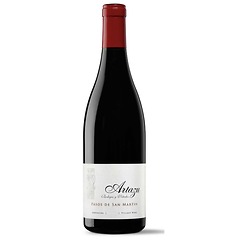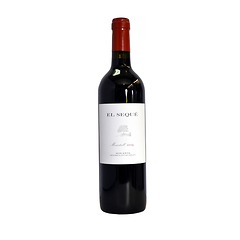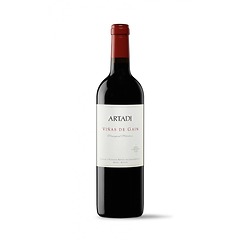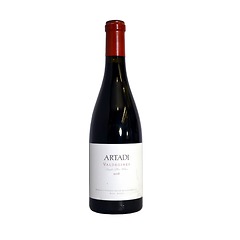Artadi
Juan Carlos Lòpez de Lacalle, owner and winemaker of Artadi, has established himself as one of the greatest names in Spanish winemaking. Playing by his own rulebook, over the previous 3 decades he has transformed Bodegas Artadi, from its humble beginnings as a small co-operative, into an undisputed superstar on the world wine stage, as well as, almost single handedly changing the face of Rioja, by shunning the antiquated Spanish wine laws, and concentrating purely on quality and terroir, rather than excessive ageing in wood. So at odds with traditional Riojan winemaking traditions is he, that despite being situated within the borders of the appellation, Artadi officially abandoned Rioja entirely in 2015, leaving the appellation behind and labelling their wines under ‘Alava – España’.
Established in 1985, Artadi started out as a co-operative of 13 growers who owned well-sited vineyards around the beautiful, walled city of Laguardia, in Rioja Alavesa. Juan Carlos, who had worked for the company from the outset, had always felt that the potential of the wonderful vineyards and terroir they had at their fingertips was not being fully realised and developed. Both politically and geologically, Alavesa is distinct from the other regions in Rioja, with the soils being predominantly limestone and chalk based as opposed to the more alluvial soils of the Alta and Baja. The vineyards are also planted up to 2000ft in elevation, clinging to the lower slopes of the Sierra Cantabria mountains, and as a consequence enjoy a much cooler, Atlantic influenced climate, gifting them much more acidity, minerality and crisp, vibrant fruit. Juan Carlos felt that the Tempranillo fruit from these sites was being ruined by the incessant overuse of oak in traditional Riojan winemaking, where the amount of time in wood decided the wines designation (Crianza or Reserva for example), by some flawed logic its price and by implication, its quality. Therefore, when he took over Artadi in 1992, he built a brand-new Bodega (where by all the wine would be made from there on), and immediately went about amending the philosophy and style of winemaking, incredibly keen to distance himself from the old-wood brigade. He removed all designations such as ‘Crianza’ and ‘Riserva’ from his labels and was amongst the first in the region to cultivate his vineyards sustainably and organically, eradicating the use of pesticides and herbicides and encouraging biodiversity. Treating the vineyards and the wine as a ‘living’ entity, not to be stripped of life, and whose produce shouldn’t be overpowered or masked by oak. Artadi would blaze a previously untrodden trail in Rioja, with a modern emphasis upon fruit driven wines, characterised by the terroir of individual vineyard sites – a far cry from the philosophy of traditional Rioja producers, and one that is just now, all these years later being adopted more and more across the region.
Over the years Juan Carlos Lopez has expanded his operation, opening properties in the regions of Navarra (in 1996) and down south in Alicante (1999), which he runs with the same dedication and philosophy and attention to detail. Embracing different micro climates, terroirs and showcasing a mastery of the craft, understanding what each varietal needs in order to flourish. He is an absolute perfectionist at heart, and his attention to detail is evidenced at all stages of the winemaking process, from the pruning in the vineyard to the six additional sorting trays in the wineries, to the specially designed vats to ensure an optimum extraction of fruit and tannin at fermentation. He is an uncompromising winemaker and the results are completely outstanding. It is no wonder that he is widely regarded as amongst the finest winemakers in Spain.
Established in 1985, Artadi started out as a co-operative of 13 growers who owned well-sited vineyards around the beautiful, walled city of Laguardia, in Rioja Alavesa. Juan Carlos, who had worked for the company from the outset, had always felt that the potential of the wonderful vineyards and terroir they had at their fingertips was not being fully realised and developed. Both politically and geologically, Alavesa is distinct from the other regions in Rioja, with the soils being predominantly limestone and chalk based as opposed to the more alluvial soils of the Alta and Baja. The vineyards are also planted up to 2000ft in elevation, clinging to the lower slopes of the Sierra Cantabria mountains, and as a consequence enjoy a much cooler, Atlantic influenced climate, gifting them much more acidity, minerality and crisp, vibrant fruit. Juan Carlos felt that the Tempranillo fruit from these sites was being ruined by the incessant overuse of oak in traditional Riojan winemaking, where the amount of time in wood decided the wines designation (Crianza or Reserva for example), by some flawed logic its price and by implication, its quality. Therefore, when he took over Artadi in 1992, he built a brand-new Bodega (where by all the wine would be made from there on), and immediately went about amending the philosophy and style of winemaking, incredibly keen to distance himself from the old-wood brigade. He removed all designations such as ‘Crianza’ and ‘Riserva’ from his labels and was amongst the first in the region to cultivate his vineyards sustainably and organically, eradicating the use of pesticides and herbicides and encouraging biodiversity. Treating the vineyards and the wine as a ‘living’ entity, not to be stripped of life, and whose produce shouldn’t be overpowered or masked by oak. Artadi would blaze a previously untrodden trail in Rioja, with a modern emphasis upon fruit driven wines, characterised by the terroir of individual vineyard sites – a far cry from the philosophy of traditional Rioja producers, and one that is just now, all these years later being adopted more and more across the region.
Over the years Juan Carlos Lopez has expanded his operation, opening properties in the regions of Navarra (in 1996) and down south in Alicante (1999), which he runs with the same dedication and philosophy and attention to detail. Embracing different micro climates, terroirs and showcasing a mastery of the craft, understanding what each varietal needs in order to flourish. He is an absolute perfectionist at heart, and his attention to detail is evidenced at all stages of the winemaking process, from the pruning in the vineyard to the six additional sorting trays in the wineries, to the specially designed vats to ensure an optimum extraction of fruit and tannin at fermentation. He is an uncompromising winemaker and the results are completely outstanding. It is no wonder that he is widely regarded as amongst the finest winemakers in Spain.
Order by




